Here’s your catch-up edition after the Parliamentary recess for the party conferences.
We’ve the full detail from the Conservative events and some snippets from the Labour Conference (we’re still awaiting some of the event transcripts and reports). In addition we have a guest slot from Nat and Stephen who attended the conferences.
Big news is the announcement that A levels and T levels are to be ditched for the Advanced British Standard qualification…in 10 years’ time, perhaps. And Minister Keegan is moving forward to establish minimum service levels for the HE sector during strike action.
Conservative Party Conference
You can read short summaries (provided by Dods) from a wide range of the fringe events held at the Conservative conference here. Pages 2-3 contain the list of fringe events for you to peruse.
Here are some teasers and snippets on the interesting ones:
Skills Britannia: Developing workforce capabilities to drive social mobility with Minister Halfon. The panellists spoke about the need for focus on vocational systems as much as the focus on universities, and the need for greater guidance to students on how they could access them.
Delivering the skills Britain needs – the role of modern universities with Gillian Keegan, Education Secretary. The session focused on skills and apprenticeships, with particular emphasis on the role which universities could play in closing the skills gap.
Snippets:
- Graham Baldwin, VC of University of Central Lancashire – modern universities deliver not just on the academic but the vocational also, collaborations with business was something that was natural to universities, universities were crucial regional anchors to delivering the skilled workforce needed by UK industry. He said that the skills gap facing the UK was a major economic threat. He said closing these gaps required expanding skills and it was crucial to ensure modern universities provided flexible learning options to make this goal achievable for a wider group of learners.
- Naomi Clayton, Learning & Work Institute, said higher education was increasingly important to growth and levelling up. She said that they needed a diversity of routes for skills education at all ages. Also spoke about the role of universities in supporting lifelong learning. She said that they needed a system which supported people to change careers and upskill throughout their lives. She said that the lifelong learning entitlement was a welcome move, but for many people, the idea of taking on more debt could be a barrier to accessing education and training.
- William Atkinson, leader of the panel for Conservative Home, asked whether they had too many people going to universities, and if not, how they could adapt their courses to encourage people to go to universities and get skills.
- Keegan said it was difficult to generalise. She said there were very few skilled careers that were not vocational or technical in nature, in some capacity. She said that it was not useful to have arbitrary targets, but they needed to make sure there were no rungs missing on the ladder for people to access a variety of opportunities.
How can science and innovation support an ambitious plan for economic growth? With George Freeman, Minister for Science. The panel discussed priorities for the Government in science and innovation, and what the main challenges facing the sector were.
Snippets:
- Freeman – the Government’s mission was to shift the economic model towards research, innovation and science, away from the current services economy. Challenges facing the sector, Freeman first argued was Whitehall’s lack of ability to move at the same pace as the science sector. Second was the lack of skills. He said there was a disconnect between recruitment lists for jobs and the source of skills to meet them in many R&D clusters. Third was the lack of devolving more powers to R&D clusters
- Professor Nigel Brandon, Dean at Imperial – wanted to see more stability in Government and a greater longevity of policies and incentives offered to the sector. He believed the priorities for research universities should be greater investment, access to a pipeline of talent and more international collaboration with other institutions.
- Giles Wilkes, Institute for Government – the most important concept for innovation is openness, picking winners was needed and UK needs to choose where to focus attention and prioritise unlike countries such as the US which can cover more ground.
Key speeches:
Labour Party Conference
Fit for the future: How UK life sciences can drive growth and improve the health of the nation with Chi Onwurah, Shadow minister for Science, Research and Innovation. The panel focused on the vital role played by life sciences to the UK economy and the importance of every region of the UK supporting this sector.
- Paul Blakely, Life Science Senior Policy Adviser, reasoned that the life science sector in the UK was now seeing a number of challenges due to increased competition in the sector due to increased investment in other countries during the pandemic. He also noted the NHS was in trouble which made the adoption of innovation difficult. He said the question was how could it be ensured that the UK maintained a competitive edge in life sciences.
- Chi Onwurah, Shadow Minister for Science, Research and Innovation, expressed her belief that science and innovation were key to our economy, growth, and to improving our quality of life. She reasoned they were therefore key to Labour’s missions, such as achieving the highest sustained growth in the G7. Chi also noted that medicine technology was an area where science could be transformative and that was what the next Labour would be seeking to unlock.
Peter Kyle, Shadow Secretary of State for Science Innovation and Technology speech announced 10-year R&D budgets. Snippets:
- This would allow relationships with industry to be built, long term partnerships to form and lead to investment in new technology and the infrastructure that underpins it. We will go further than ever before to make Britain the best place to innovate.
- We’ll increase the number of University spinouts, accepting the recommendations of our start-up review. That includes better tracking of spinouts from universities with a dashboard to identify what’s working and where there are barriers. And we will work with universities to ensure there are a range of options on founder-track agreements helping to boost spinouts and economic growth.
Making Britain Work – Modern Universities and the Public Sector Workforce with Andrew Gwynne, Shadow Minister for Social Care. The panellists discussed the workforce crisis in the public sector and the important role universities played in training the next generation of public sector workers. The conversation predominately focused on the recruitment, training and retention of teachers and nurses, with panellists discussing why these vital sectors had become less attractive career paths.
Research
George Freeman, science research and innovation minister, wrote for Research Professional in Sold on science. The article is a quick whizz through all the major R&D developments introduced by the Conservative party from the ringfencing of R&D spend to the development of ARIA. It’s an easy read and show the policy progression of the last 13 years, or as Freeman names it the Conservatives legacy.
At the Conservative Party Conference Michelle Donelan (DSIT Secretary of State) announced:
- AI: a £8 million will be available for AI scholarships over the next 12 months giving 800 more people the opportunity to start on courses. The funding will be disbursed by the OfS.
- Innovation: a new £60 million Regional Innovation Fund (more on this below)
- Characteristics: A review into use of sex and gender questions in scientific research and statistics (including those conducted by public bodies). This Cabinet Office review will be led by Professor Alice Sullivan (UCL) (funding provided by ESRC) and will produce guidance on the topic by May 2024. The terms of reference for the review are currently being discussed.
The Regional Innovation Fund will:
- boost support for universities in areas with low levels of R&D investment.
- be relative to the size of each UK nation (£48.8 million for 110 universities across England, delivered by Research England).
- Allocations to the devolved administrations will be : £5.8 million for Scotland, £3.4 million for Wales and £2 million for Northern Ireland.
Biggest bang for our physics buck
DSIT published a policy paper UK strategy for engagement with CERN: unlocking the full potential of UK membership of CERN which aims to ensure the UK gains a good return on its membership of CERN. The UK is one of 12 members of CERN which aims to uncover the mysteries of the universe, including what it is made of and how it works. Space is an important investment area for the Government and they’re keen to maximise the UK’s research potential and leverage funding. CERN is better known for being the creators of the World Wide Web. Minister for Science George Freeman stated: As the second largest contributor to CERN, our return on investment is below where we would like it to be, with much more we can still do to ensure we take full advantage of all opportunities that are afforded by CERN membership. The strategy covers five areas:
- Research excellence: including more high-impact papers and maintenance of the UK’s global research ranking, contributing to the government’s science superpower ambition.
- World class skills :increased numbers of highly skilled technicians, engineers and scientists whose skills and expertise can be deployed in a variety of fields, advancing industrial capability and attracting world class talent to study and work in the UK.
- Commercial impact and innovation: increased uptake of innovation and commercial opportunities that drive growth in the UK and for the UK to be the partner of choice for international collaboration; and using business engagement with CERN to drive technological capability and innovation.
- International leadership: increased championing of our principles for engagement on a global stage, including diversity and inclusion, and more UK nationals in positions of leadership.
- Engage and inspire: increased awareness and appreciation of the profound impact that science and technology has on everyday life and more students pursuing STEM subjects, specifically:
- Encourage people of all ages and backgrounds to pursue careers in STEM through the inspiration of CERN’s discovery science and technology.
- Engage the public about the importance of STEM research and its societal impact.
- Motivate all UK CERN stakeholders to set as ambassadors for the opportunities afforded by big science to people of all backgrounds.
More detail here.
Admissions: The Advanced British Standard
Rishi’s speech to the Conservative Party Conference said he was committed to stopping universities from enrolling students on courses that do nothing for their life chances, and that the target for 50% to attend HE as a false dream.
UUK Chief Executive, Vivienne Stern, responded to Rishi’s speech commenting: This political rhetoric is not in the interests of students, or the economic prospects of the country as a whole. We should be expanding opportunities and not talking down what is a national success story.
The biggest education announcement of the conference was Rishi’s intention to introduce the Advanced British Standard (ABS), a new Baccalaureate-style qualification for 16- to 19-year-olds which would bring A levels and T levels into a single qualification. The outline of the qualification would include 195 hours more teaching than current provision and learners would study five subjects. Responses to the announcement haven’t balked at a potential change to the long established A level system. Instead the ABS plans have been heavily criticised as there are already concerns for teacher recruitment/retention, particularly in FE, and sector commentators note increasing the number of teachers (even through incentives) is unlikely to yield the level of staff needed to deliver the qualification. If successful the change to ABS would be phased in over the next 10 years. The Guardian has coverage on the teaching crisis angle, highlighting an additional 5,300 teachers would be needed (not to mention a significant uptick in the education budget to fund them). There are more responses to the announcement from the HE sector here.
Education Secretary Gillian Keegan also spoke about the ABS in a subsequent speech.
Shortly after the speech the DfE published a 47 page paper: A world-class education system – The Advanced British Standard, meaning these plans have been in the offing for a while (and Maths to 18 was a key pledge in Rishi’s bid for PM). There’s a shorter Government press release here.
We have a summary if you’d like more detail on the ABS, summary content is drawn from the DfE paper.
The next steps in the ABS journey are:
- Reforms are unlikely to be realised for at least a decade – with the pupils starting primary school this term expected to be the first cohort.
- Government will launch a formal consultation on the “approach and design of our new qualification, and the accompanying work to strengthen the system to deliver it in the coming months”.
- This will inform a White Paper to be published next year.
Party Conference roundup
Nathaniel Hobby and Stephen Bates feature in our latest guest update on the conferences. Nat and Steve attended the Liberal Democrat, Conservative and Labour Party conferences to understand future opportunities for BU, and to meet with fellow public affairs professionals to talk about collaboration in the coming year and here is their update.
- At the Labour Party conference, Professor John McAlaney spoke on a panel about responsible gambling and, specifically, updates needed to legislation to help protect from gambling addiction and harm
- Party conference season has been interesting, with polarising moods depending on which Party you speak to.
- For the Liberal Democrats, investment in health and care was front and centre, and it was said to be the key issue they will stand on in the next election – well timed with BU’s roundtable discussion following an announcement of the Lib Dems £5bn free personal care plan. Hosted in Bournemouth, the conference was busy with a positive mood towards the future.
- At the Labour Party Conference, the mood was very optimistic; among Labour Party members and politicians there is a general view that the next election is theirs to lose, and the optimistic mood is a welcome change to the current political climate. A buzzword that came up more than once was this being the time for a ‘prevention revolution’ in a number of areas. Fringe events on alcoholism prevention, gambling addiction prevention (including BU) and healthcare interventions to prevent health problems later in life were littered across the schedule.
- There was a focus on the Labour manifesto and the subject of technology, a lot about the speed of change in technology and the need for political wheels to move faster. Specifically, it was seen that there is a need to focus on opportunities in the next manifesto, even in areas that can seem risky, as the gear change the country needs.
- A constant throughout the fringe sessions was a frustration on the lack of collaborative working across sectors, governments, organisations and including universities to solve societal or local issues. Whether it is skills, care, social mobility, jobs or governmental issues, a key thread was the seeming, or perceived, lack of collaboration and co-working for the good of people in local areas. Universities have a role to play in supporting the collaboration, but also being vocal where these collaborations are already happening as a way of fighting the current perception.
- In HE, the subject of tuition fees was back on the agenda, and it isn’t good news, with a Public First polling report (summarised elsewhere in this update) showing that there is not a lot of public support for increases. At many of the sessions, the mood music was that the HE sector still needs to do much more to show its value to the public, and ‘playing nicely’ with FE, apprenticeships and the skills agenda to look to the long term. Almost universally in any fringe event connected to HE was an agreement that FE and HE need to get as close to it as possible. As one panellist put it, “Universities aren’t the priority for the public and no political party will want to be seen to be adding to the public debt” so universities will need to work much harder to rise up a very busy post-election agenda.
- For the Conservatives, there were reports in the media of low attendance in the main hall of the Conservative Party Conference but the fringe events were very busy and well attended.
- Two big themes in the main auditorium were how the UK could/should become a superpower in Science and Innovation and apprenticeships. Imperial and UCL both sponsored events discussing building Britain’s science innovation which were attended by George Freeman (Minister of State for Science, Research and Innovation) and Andrew Griffith (Economic Secretary to the Treasury) respectively.
- The question of university funding and the fact that international students now fund the shortfall in costs for domestic students, as opposed to providing additional research funding, was more of a focus for the Conservatives. The ministers appeared to agree that this was not a sustainable set up, although no answers to the problem were discussed. Interestingly George Freeman noted that the policy for university funding lies with the Department for Education but it clearly has a knock on impact for the Department for Science, Innovation and Technology who own research funding.
- Secretary of State for Education, Gillian Keegan, attended an event hosted by Policy Exchange and Grant Thornton on degree apprenticeships. As a degree apprentice herself, Gillian Keegan is clearly very passionate about them and, although she said she wouldn’t implement targets, there is going to be a clear policy drive on that if she keeps the brief. She was joined on the panel by the VC of Manchester Metropolitan University who have around 2500-degree apprentices, and Labour Metro Mayor of Liverpool Steve Rotherham who is also a big supporter and will carry on that support if Labour win the next election. Minister of State for Skills, Apprenticeships and Higher Education, Robert Halfon joined a panel discussion on apprenticeships for school leavers and UCAS joined a panel discussion in the Youth Zone about making it easier for young people to find apprenticeships and explaining how their portal will soon be a one stop shop for apprenticeships and degree courses.
Students
Student withdrawals
The SLC published the (early) in-year student withdrawal statistics. The figures compared the number of students withdrawing from university over five academic years from 2018-19 to 2022-23.
- In 2019-20, a total of 29,630 withdrew.
- In 2020-21, a total of 31,279 withdrew.
- In 2021-22, a total of 39,405 withdrew.
Student Needs
Advance HE published the Student Needs Framework. It maps and categorises students’ needs as:
- Individual competence, Confidence and Resilience; and
- Belonging and Community.
It’s a broad overview and doesn’t delve into interventions and explore the multiple ways students may manifest their individual needs. Advance HE say: The framework is designed flexibly to support a broad range of colleagues, especially those involved in teaching, learning and student support in strategic or in practice roles. It will be most effective if adopted at an institutional level, mapped with consideration to your institutional context and priorities to enhance practice and policy.
More information here.
Uni Connect
The OfS published the independent evaluation of the Uni Connect programme’s impact on outcomes for learners. The report is based on learner survey findings after Wave 4 of the project and it recommends that Uni Connect partnerships and individual HEIs should:
- Continue to offer sustained and progressive outreach to maximise the impact of Uni Connect on learners’ outcomes.
- Embed personalised support, such as mentoring and masterclasses, with lighter-touch activities such as campus visits, in a multi-intervention approach.
- Ensure information, advice and guidance focuses on the financial support available (in addition to the costs) and the non-financial benefits (as well as the financial benefits) of HE.
- Deliver interventions for key influencers.
- Work with schools and colleges to support attainment-raising.
Industrial action: minimum service levels
At the Conservative Conference Gillian Keegan, SoS Education, announced a consultation to introduce minimum service levels in universities during strike action to ensure students receive the teaching they deserve. The DfE have announced more details: The consultation will focus on stronger protections for final year students, key cohorts or those studying specialist subjects. If introduced, the minimum service level could ensure students get the education they pay for, protecting them from strike action, for example looking at how to guarantee continued services such as teaching contact hours and marking their work during walkouts.
The minimum service concept isn’t new – the Act requiring minimum service levels was passed in July 2023 and applies to education services alongside health, fire and rescue, transport, nuclear activities and border security. However, to implement this legislation regulations are required for each service. And a consultation was launched in August on some aspects of the implementation including what reasonable steps means.
In the DfE press release the government link the minimum service expectation with their priorities of ensure quality degree delivery (and value for money) and the OfS recruitment limits where courses have high student drop out. They state: Today’s announcement is another step in a series of long-term decisions to ensure a bright future for all children and young people, whether it be starting school, through to going to university or undertaking an apprenticeship.
We’ll be watching closely to see how they define minimum service for education, and specifically HEIs. Watch this space.
Regulatory | Free Speech
Here’s a reminder on the HE (Freedom of Speech) Act, which involves:
- a new strengthened duty to promote freedom of speech and academic freedom
- new OfS condition(s) of registration
- requirements for codes of practice
- regulation of students’ unions on freedom of speech
- the introduction of a statutory tort
- establishment of a free speech complaints scheme
- creation of the role of the Director for Freedom of Speech and Academic Freedom
- monitoring of overseas funding in relation to risks to academic freedom and freedom of speech
- prohibition of non-disclosure agreements in complaints relating to harassment and sexual misconduct
UUK published a briefing and case studies aiming help universities to prepare for the HE (Freedom of Speech) Act. It sets out summarises the new legislation, highlights the consultation for the new OfS conditions of registration has not yet been published, explains the statutory tort, complaints and overseas funding. Helpfully it contains some information on the other legislations and legal duties which overlap or contain free speech content.
Fees
With the likelihood of a 2024 election looming attention turns once again to HE tuition fees. Public First published an interesting report Public Attitudes to Tuition Fees: What are Labour’s Options for Reform? The key findings are below but in short it’s a wicked problem – people want fees to be free or lower but don’t want to pay for them from the public purse, the level of debt students leave HE with remains an emotive issue.
- Labour made the right decision politically on fees. Our research confirms that Labour made the right electoral decision to move away from their pledge to abolish tuition fees. It is a decision that benefits Labour significantly more than it costs them as they head towards the next general election. By 43% to 30%, respondents thought Starmer was right to go back on the pledge to abolish tuition fees. Swing voters are even more likely to think that Starmer was right, with 48% saying he was right to drop the pledge, and 28% saying he was wrong to do so.
- Tuition fees are not a popular policy; in the abstract, there is a high level of support for fee abolition. People believe higher education is important: parents want their children to go to university, and they believe the cost is too high. They would ideally like to see fees cut or abolished entirely. This is broadly true across all demographics.
- However, people also think that there are other, more pressing priorities for spending, particularly in times of financial crisis. When we asked a narrow and direct question about whether people supported fee abolition, there was widespread support, but when the question was posed differently, with people given a list of options for the to pursue, or when people were told how much fee cuts would cost the taxpayer, support fell away.
- No matter how popular abolishing fees is in principle, in practice people are very against subsidising changes through general taxation. When informed of the overall cost, fee abolition is seen as too expensive, and there is little real appetite for it among voters. With the exception of raising corporation tax to pay for the abolition of fees, every other option has net negative support(more people oppose than support). It was the prospect of personal taxes and VAT rising to fund a fee cut that particularly put people off a fee cut. Hearing the scale of funding needed – and how this might need to be paid for – was a significant concern to voters
- People want university to be more affordable for students in the short term. Returning to maintenance grants was considered a popular alternative to the abolition of fees. Against the backdrop of the cost-of-living crisis, many considered the cost of the university experience as prohibitive (at least in principle). Voters are also supportive of cutting fees in certain circumstances – such as for those from low income families or studying socially and economically important courses (such as teaching or nursing).
- Reducing tuition fees is popular (although paying for it is not). Across the board, people think fees are too high and that people leave university with excessive debt. They would like to see tuition fees reduced, with £6,500-£7,000 being the most popular choice. In particular, people are sympathetic to the plight of young people who leave education with such high levels of debt (which most people hate) but are unsure what the alternatives are. Respondents reject the idea that fees should go up with inflation but are supportive in the abstract of the government providing additional support when this is framed as limiting the cost increase for students.
- There is a relatively high level of support for employers making a contribution to the higher education funding system. When described as a levy that businesses pay to universities who train their workers, 59% were in support, making it a more popular choice than additional government funding. Support dropped to 39%, however, when this was framed as higher taxes employers would pay in order to hire graduates – consistent with our findings throughout that there is widespread lack of support for higher taxation in any form.
- There are more rewards than risks for Labour when moving away from the abolishing tuition fees pledge. Abolishing or not abolishing fees has little difference on the voting intention for existing Labour voters but is an important policy choice for undecided or swing voters. We estimate there are 83 seats in total where Keir Starmer’s decision not to abolish tuition fees significantly boosts Labour’s chance of winning the seat – including places such as Buckingham & Bletchley; both Isle of Wight seats; and Mansfield.
- U-turning on fees may have positive electoral consequences, but it shouldn’t be shouted about. Our results suggest that dropping the pledge has a relatively minimal impact among Labour’s supporters, and if anything is assisting support among those who have switched over from the Conservatives. Labour moving away from fee abolition is likely to have positive electoral consequences, but the act of u-turning on yet another policy position should not be taken lightly. The public needs more information about the context surrounding changing policy positions, such as the impact of the economic environment on decision making and/or what that money would be spent on instead.
- Restoring maintenance grants is the option most likely to be both a vote winner and a seat winner for Labour. It was also the option where respondents seemed content for the taxpayer to fund the commitment. When we asked voters directly if they supported reintroducing maintenance grants, assuming the extra cost would be paid for through increased taxation, 55% said they did, while just 14% said they would be opposed. 50% of respondents said they would be more likely to vote for a party which pledged to reintroduce maintenance grants, and just 8% said they would be less likely to do so.
- Introducing a graduate tax was also more popular than abolishing fees outright, particularly amongst younger voters. Reforms to student repayments could help shore up support amongst highly educated progressives. Voters supported the idea of a graduate tax by 43% to 22%. Young voters supported this most enthusiastically: 18-24s support it by 53% to 18%, and 25-34s by 50% to 22%. 36% of respondents overall said they would be more likely to vote for a party planning to introduce a graduate tax, compared to 19% who said they would be less likely.
- There is massive, untapped support for more investment in FE. While there is widespread support for higher education in principle and practice, there is significantly more public support for further education and apprenticeships – and far more than the politicians give credit for. Politicians of all parties ought to be talking more about FE, apprenticeships and training. This is particularly true amongst swing voters, and those in target red wall seats which do not have a local higher education institution.
A manifesto for HE and Research
HEPI ran fringe events at both Conservative and Labour party conferences asking what should be in the party’s manifesto for HE and research. The recording of the Conservative event is here, the Labour event content isn’t available (yet). Ahead of the fringe events HEPI published a Higher Education Policy Institute report on three vice-chancellors’ hopes ahead of the party conferences. It set out the perspective of three HEI leaders on what they wanted to see in the manifestos for HE at the next election.
The essays all emphasise the centrality of HE to the UK’s future success and cover a broad range of themes, including research, local partnerships, and a long term skills strategy. There are some areas of consensus among the three authors (tackling the cost-of-living crisis among students and the growing shortage of student accommodation). However, they differ in their prioritisation of the request for more public funding. The essays are worth a read, even if a bit predictable.
Chris Husbands (Sheffield)
- Government should establish a National Skills Council, bringing together government, universities, further education colleges, sector bodies and business leaders to shape a long-term skills strategy founded on collaboration.
- … current support from Innovate UK and Higher Education Innovation Funding (HEIF) should encourage differentiated institutional missions and structures, which might focus on educational cold spots, or offer specific teaching-only vocational provision, tailored to the region
- Government needs to re-engineer the Student Loans Company to drive flexible and part-time learning
- Given resource constraints, we propose to fast-track the delivery of the LLE via regional Higher Skills Centres (HSC), focused on mature learners, and located in educational cold spots across the UK rather than a wide-scale rollout – for which systems and demand are still underdeveloped.
- ….regional business support needs to be restored with universities as key partners
- Government should create a ‘shared apprenticeship facility’ which would enable SMEs to pool their apprenticeship demands and connect to training providers, including universities
- Government should establish a funding pot, which need not be large, to drive higher education and further education collaboration in areas where advanced training provision is underdeveloped – largely those towns and smaller cities which do not have a university presence
- The Office for Students should be merged with the Office of the Independent Adjudicator for Higher Education to provide coherent oversight in the student interest.
- Government should establish a strategic Tertiary Funding Council with oversight of the sector and the sustainability of institutions, with a more systemic view of the potential of universities to contribute to the full range of economic and social objectives.
Sasha Roseneil (Sussex)
- A COVID generation student premium
- A mental health and wellbeing support grant and University Clinics
- A ‘Science Superpower and Crucible for Creativity’ grant
- A new focus on student maintenance
- An independent, comprehensive review of university funding, to include citizens’ voices
- Facilitating local public investment in student housing
- Universities under a single government department
Adam Tickell, Birmingham
- Foster a conducive environment for universities to thrive, so they can help to tackle the pressing challenges facing the country
- Prioritise quality-related funding to allow universities to pursue high-risk high-reward discovery research
- Adopt a long-term, sustainable and predictable funding model for higher education to protect universities’ future
- Rebalance the current framework so that UK R&D remains internationally competitive
- Promote and support UK universities on the world stage to maintain the UK’s attractiveness to international students
- Set the broad policy parameters, then leave universities to get on with what they do best
Another manifesto: what might be in the King’s Speech
But before we get to an election, Policy Exchange have published a manifesto for the next session of Parliament – Iain Mansfield’s request for the King’s Speech. It includes a proposal for a Higher Education and Skills Bill (for England only), most of which will not be surprising to those who follow Iain on X or other platforms:
- Cap overall student numbers:
- To impose a duty upon the Education Secretary to, on an annual basis, determine the total number of undergraduate university places that would be funded for the following academic year, at least three months prior to the beginning of that year’s university application cycle.
- In the event that Parliament did not approve a new annual quantity of places, the number of places funded would be the same as in the previous year.
- The number of places funded may not be lower than 95% of the total number of places funded the previous year
- Make the OfS share the cap out between providers based on a massive complex bidding system
- To impose a duty upon the Office for Students to apportion the limit on funded places amongst higher education providers by imposing a limit on funded places upon each provider.
- In determining the limits upon each provider, the Office for Students may consider:
- The wishes of the provider.
- The need to maintain stability within the sector.
- The student outcomes achieved by the provider, as measured by completion rates, progression to highly skilled employment or further study and earnings.
- National skills shortages, as specified in the Shortage Occupation List published by the Migration Advisory Committee.
- The sufficiency of student accommodation provided by the provider or available in the vicinity of the provider.
- Whether or not the provider is currently subject to one or more specific ongoing regulatory conditions of registration.
- Guidance or Directions issued by the Secretary of State under Section 2 or Section 77 of the Higher Education and Research Act 2017.
- The need to protect institutional autonomy.
- In determining the limits upon each provider, the Office for Students may not consider:
- The content of courses at the provider, and the manner in which they are taught, supervised or assessed,
- The criteria for the selection, appointment or dismissal of academic staff, or how they are applied, or
- The criteria for the admission of students, or how they are applied.
- In determining the limits upon each provider, the Office for Students may not impose a limit that is lower than 95% of the limit imposed the previous year, unless the provider requests such a limit.
- To impose a duty upon the Office for Students to impose a fine upon any provider that exceeds their place limit equal to twice the total value of tuition fees that would be paid by those students over the course of their studies.
- The Office for Students may, at its discretion, choose to waive the fine for a provider that exceeds its place limit but does so by less than 2%, where it is satisfied that this was neither negligent nor intentional.
- The Office for Students may not waive the fine for a provider more than once in any three year period.
- To provide a right of appeal against such a fine the basis of severe procedural irregularities or significant factual errors only.
- To provide that the Open University shall be exempt from all limits on funded places.
- And then to also incentivise employers to invest in training
- To create a Skills Tax Credit that would enable all businesses to claim a tax relief equal to 10% of the money spent on skills development that could be offset against their corporation tax.
- Eligible skills spend would include spending on apprenticeship wages, any course at a UK Further Education College, registered independent training provider or registered higher education provider, T-Level placements (up to £1000 per placement), Skills Bootcamps and the cost of external trainers brought in for skills development.
- Excluded skills spend would include any training required solely or primarily to comply with statutory obligations, such as the Health and Safety at Work Act 1974 or the Bribery Act 2010
There are other proposals in the paper including on housing, leaseholder enfranchisement, anti-social behaviour etc. Not sure that any of this will turn into reality, certainly not in the King’s Speech this autumn, but these things may pop up in election material.
Access & Participation
The Sutton Trust has published the report 25 years of university access setting out how access to HE has changed over time. See page 4 for the key findings.
Inquiries and Consultations
Click here to view the updated inquiries and consultation tracker. Email us on policy@bournemouth.ac.uk if you’d like to contribute to any of the current consultations.
Other news
Medical schools: The government has asked the OfS to allocate an additional 205 places for medicine study as part of the drive to increase the number of doctors needed in the UK. Contact us for more information on this.
Cyber defence: UUK published guidance outlining the main cyber security threats to the HE sector and the impact of recent attacks against individual organisations. Actions universities are recommended to take include:
- Review institutional security posture using the four-pillar security posture model described in the introduction.
- Business continuity: make sure everyone in your organisation knows what to do in the event of a serious security incident. Regularly rehearse scenarios with a view to continual improvement, remembering to reflect changes in the threat landscape and technology.
- Share and collaborate: Defending as one, higher education institutions should work together to share threat intelligence and expertise, which has a positive impact on the sector’s preparedness and capability to respond, both tactically and strategically.
Subscribe!
To subscribe to the weekly policy update simply email policy@bournemouth.ac.uk. A BU email address is required to subscribe.
External readers: Thank you to our external readers who enjoy our policy updates. Not all our content is accessible to external readers, but you can continue to read our updates which omit the restricted content on the policy pages of the BU Research Blog – here’s the link.
Did you know? You can catch up on previous versions of the policy update on BU’s intranet pages here. Some links require access to a BU account- BU staff not able to click through to an external link should contact eresourceshelp@bournemouth.ac.uk for further assistance.
JANE FORSTER | SARAH CARTER
VC’s Policy Advisor Policy & Public Affairs Officer
Follow: @PolicyBU on Twitter | policy@bournemouth.ac.uk
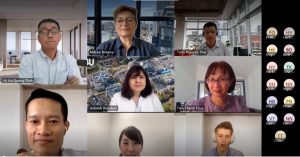 The initiative brings together four universities: Bournemouth University (UK), British University Vietnam, University of Economics Ho Chi Minh City (UEH), and Tra Vinh University (TVU), with the BU partners being from the North (Hanoi), the South (Ho Chi Minh City) and the deep South (Tra Vinh province) in Viet Nam. In addition to these institutions, the project also involved two students from the BU MBA programme that worked on a consultancy project related to the DX project.
The initiative brings together four universities: Bournemouth University (UK), British University Vietnam, University of Economics Ho Chi Minh City (UEH), and Tra Vinh University (TVU), with the BU partners being from the North (Hanoi), the South (Ho Chi Minh City) and the deep South (Tra Vinh province) in Viet Nam. In addition to these institutions, the project also involved two students from the BU MBA programme that worked on a consultancy project related to the DX project.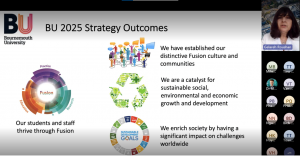 Session 1, led by Bournemouth University, was delivered by the project PI, Dr. Milena Bobeva, Internationalization Lead of the Bournemouth University Business School, and the Co-I on the BU side, Assoc. Prof. Dr. Gelareh Roushan, Head of the Fusion Learning Innovation and Excellence Center (FLIE). This enlightening session delved into Bournemouth University’s organizational structure, its visionary 2025 strategy, and strategic outcomes. The spotlight was on FLIE, the driving force behind the university’s digital transformation. Dr. Gelareh Roushan provided valuable insights into FLIE’s support for academic staff in designing, delivering, and evaluating exceptional educational practices, using online resources, masterclasses, and bespoke sessions. The effectiveness of the university’s virtual learning environment, Brightspace, was apparent, offering numerous benefits for both staff and students.
Session 1, led by Bournemouth University, was delivered by the project PI, Dr. Milena Bobeva, Internationalization Lead of the Bournemouth University Business School, and the Co-I on the BU side, Assoc. Prof. Dr. Gelareh Roushan, Head of the Fusion Learning Innovation and Excellence Center (FLIE). This enlightening session delved into Bournemouth University’s organizational structure, its visionary 2025 strategy, and strategic outcomes. The spotlight was on FLIE, the driving force behind the university’s digital transformation. Dr. Gelareh Roushan provided valuable insights into FLIE’s support for academic staff in designing, delivering, and evaluating exceptional educational practices, using online resources, masterclasses, and bespoke sessions. The effectiveness of the university’s virtual learning environment, Brightspace, was apparent, offering numerous benefits for both staff and students.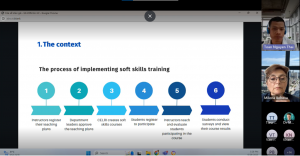 Session 2, led by Tra Vinh University (TVU), featured a dynamic team of speakers who unveiled the university’s remarkable strides in digital transformation. Ms. Nguyen Thi Mai Khanh and Mr. Nghi Vinh Khanh, introduced the university’s visionary roadmap, aligning technology with a commitment to educational excellence.
Session 2, led by Tra Vinh University (TVU), featured a dynamic team of speakers who unveiled the university’s remarkable strides in digital transformation. Ms. Nguyen Thi Mai Khanh and Mr. Nghi Vinh Khanh, introduced the university’s visionary roadmap, aligning technology with a commitment to educational excellence. Session 3, presented by British University Vietnam (BUV), featured Dr. Mike Perkins, Senior Lecturer and Head of the Center for Research and Innovation, and Mr. Benjamin Robinson, LMS Curriculum Designer. BUV’s innovative approach to digital transformation was highlighted through the upgrade of its Learning Management System (LMS), enabling a fully blended mode of education. The university’s clever use of familiar tools like Excel empowered academic staff, facilitating the creation of digital courses and improved data utilization. Notably, BUV’s work on a generative AI chatbot, designed to ethically support students, promises to be a significant future advancement.
Session 3, presented by British University Vietnam (BUV), featured Dr. Mike Perkins, Senior Lecturer and Head of the Center for Research and Innovation, and Mr. Benjamin Robinson, LMS Curriculum Designer. BUV’s innovative approach to digital transformation was highlighted through the upgrade of its Learning Management System (LMS), enabling a fully blended mode of education. The university’s clever use of familiar tools like Excel empowered academic staff, facilitating the creation of digital courses and improved data utilization. Notably, BUV’s work on a generative AI chatbot, designed to ethically support students, promises to be a significant future advancement.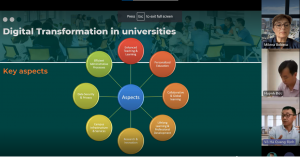 The closing session, led by the University of Economics Ho Chi Minh City (UEH), featured Mr. Huynh Duc, Executive of UEH International Office, and Dr. Vo Ha Quang Dinh, Head of the Department of Information Technology. UEH shared its comprehensive strategy, focusing on eight aspects of digital transformation across three pillars of Administration, Training, and Research. Noteworthy was the university’s pioneering efforts in preparing for the future, including plans for big data utilization to create datasets for research and administration, as well as the anticipation of utilizing ChatGPT to support students and staff.
The closing session, led by the University of Economics Ho Chi Minh City (UEH), featured Mr. Huynh Duc, Executive of UEH International Office, and Dr. Vo Ha Quang Dinh, Head of the Department of Information Technology. UEH shared its comprehensive strategy, focusing on eight aspects of digital transformation across three pillars of Administration, Training, and Research. Noteworthy was the university’s pioneering efforts in preparing for the future, including plans for big data utilization to create datasets for research and administration, as well as the anticipation of utilizing ChatGPT to support students and staff.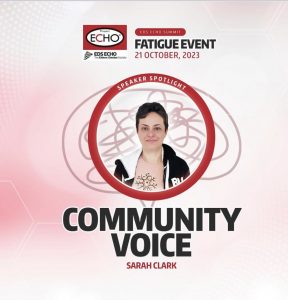
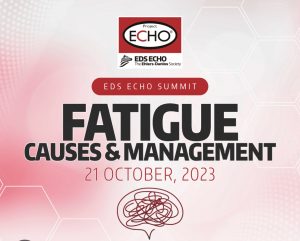

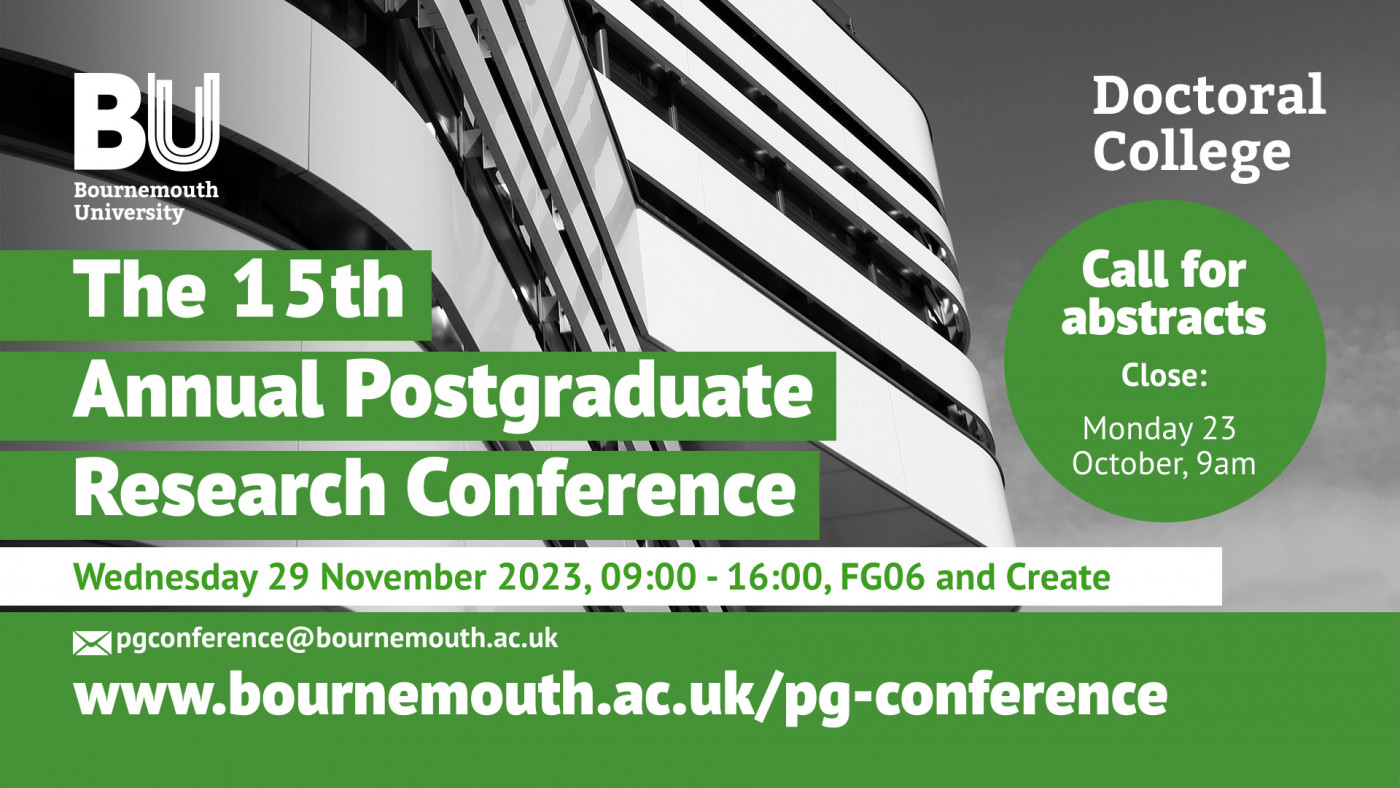
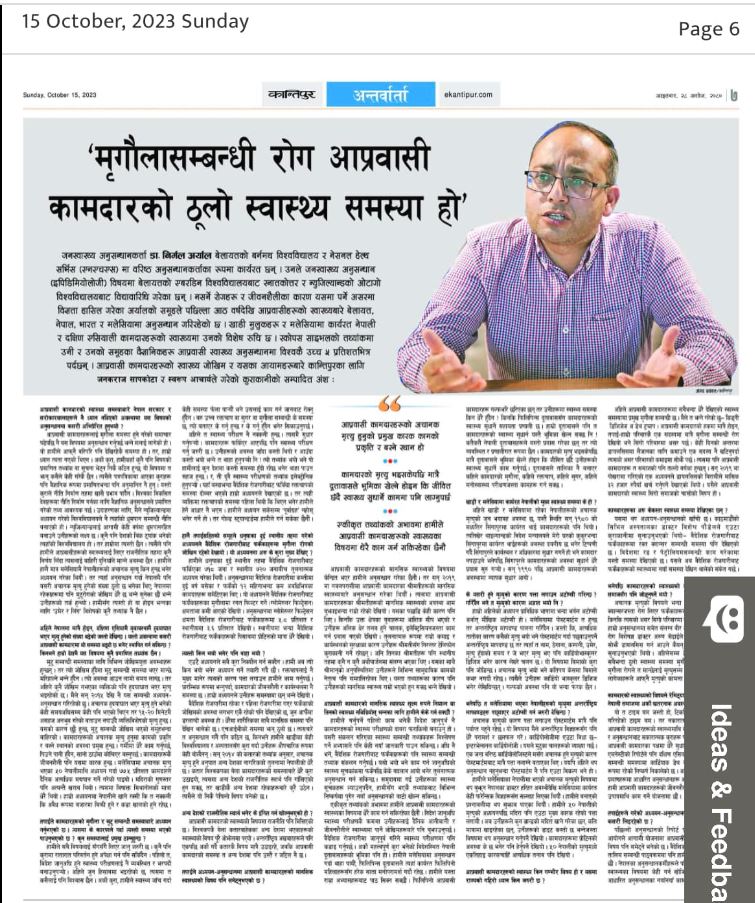

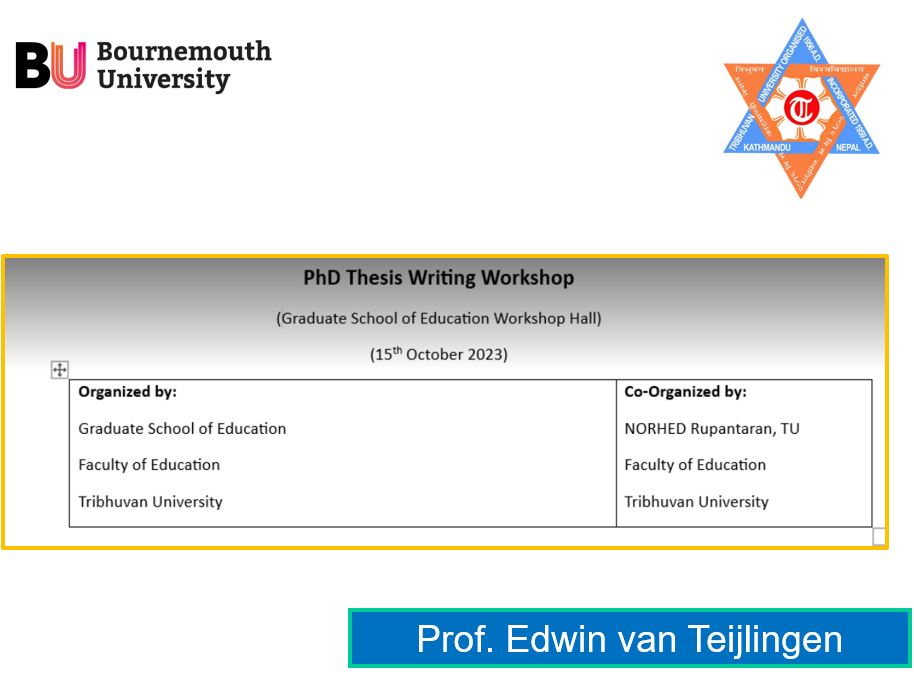

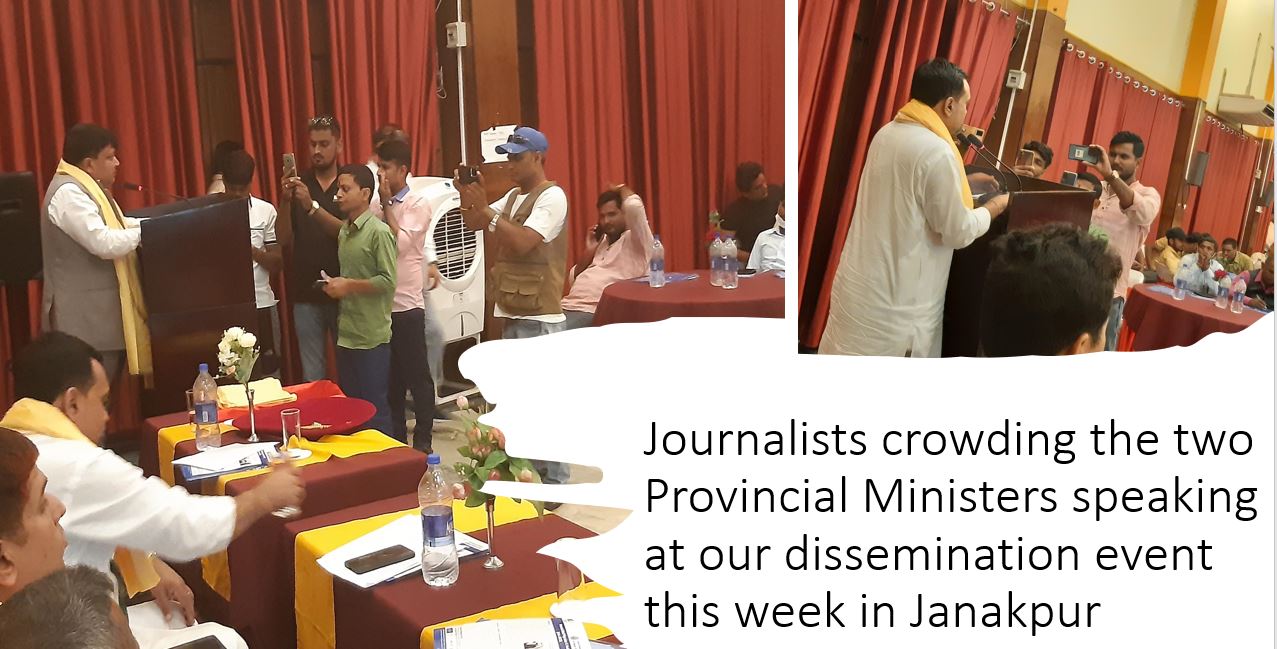
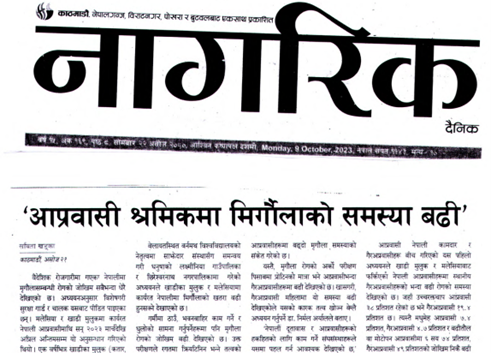

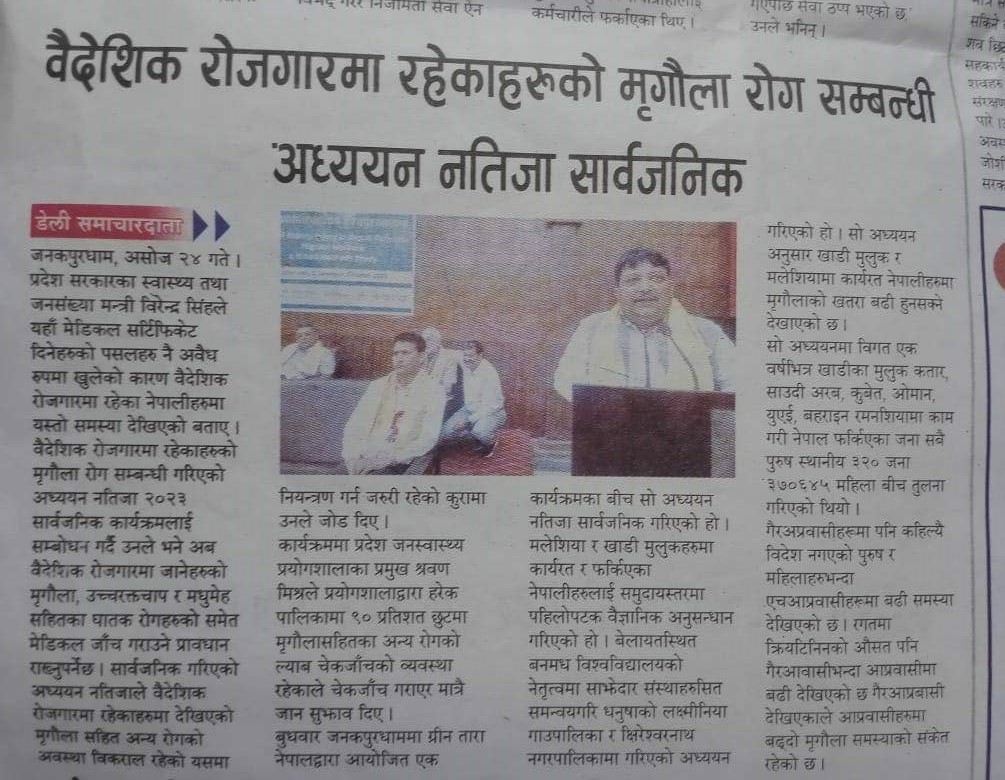
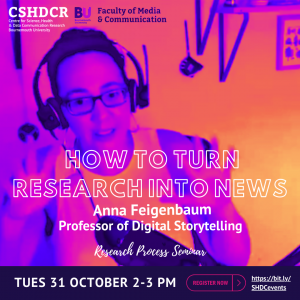
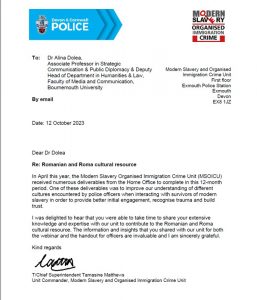 Dr. Alina Dolea, Associate Professor in Strategic Communication and Public Diplomacy and Deputy Head of Department in Humanities and Law, received a letter of thanks from the UK Modern Slavery and Organised Immigration Crime Unit (MSOICU).
Dr. Alina Dolea, Associate Professor in Strategic Communication and Public Diplomacy and Deputy Head of Department in Humanities and Law, received a letter of thanks from the UK Modern Slavery and Organised Immigration Crime Unit (MSOICU).
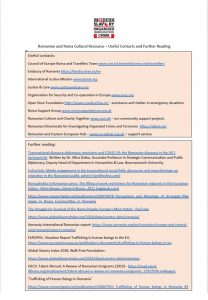
 UKRIO has announced details of a forthcoming Free Webinar “Introduction to Research Integrity” on Wednesday 18th October from 10:00 – 11:00 BST.
UKRIO has announced details of a forthcoming Free Webinar “Introduction to Research Integrity” on Wednesday 18th October from 10:00 – 11:00 BST. 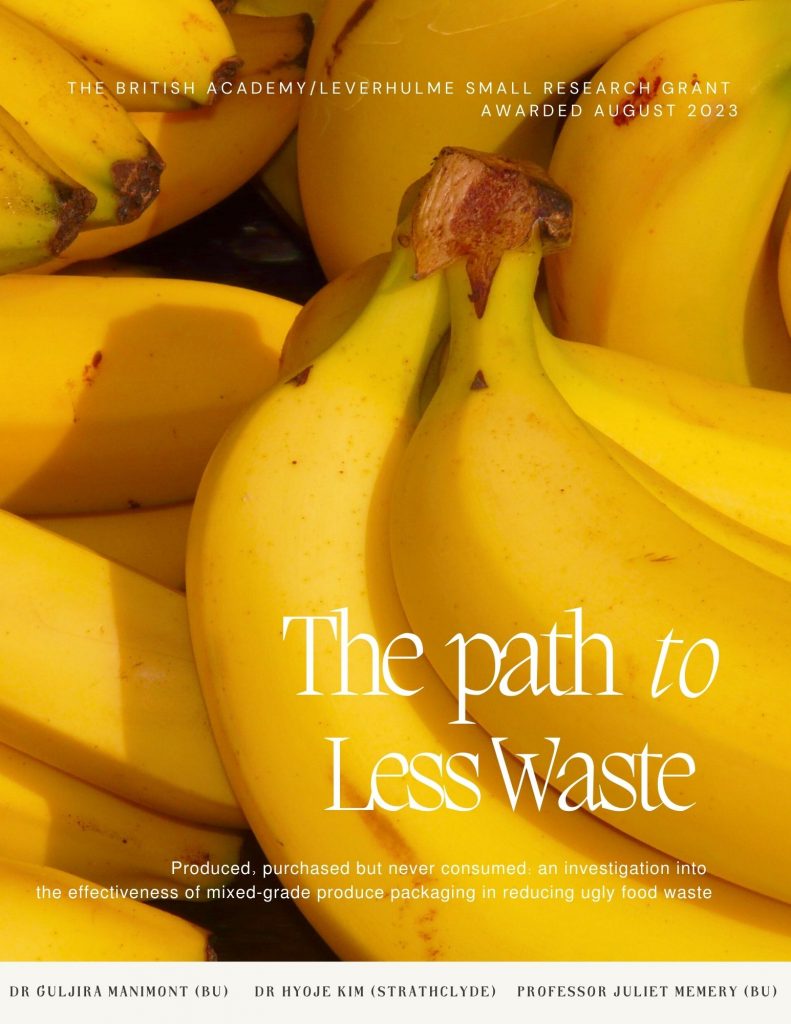
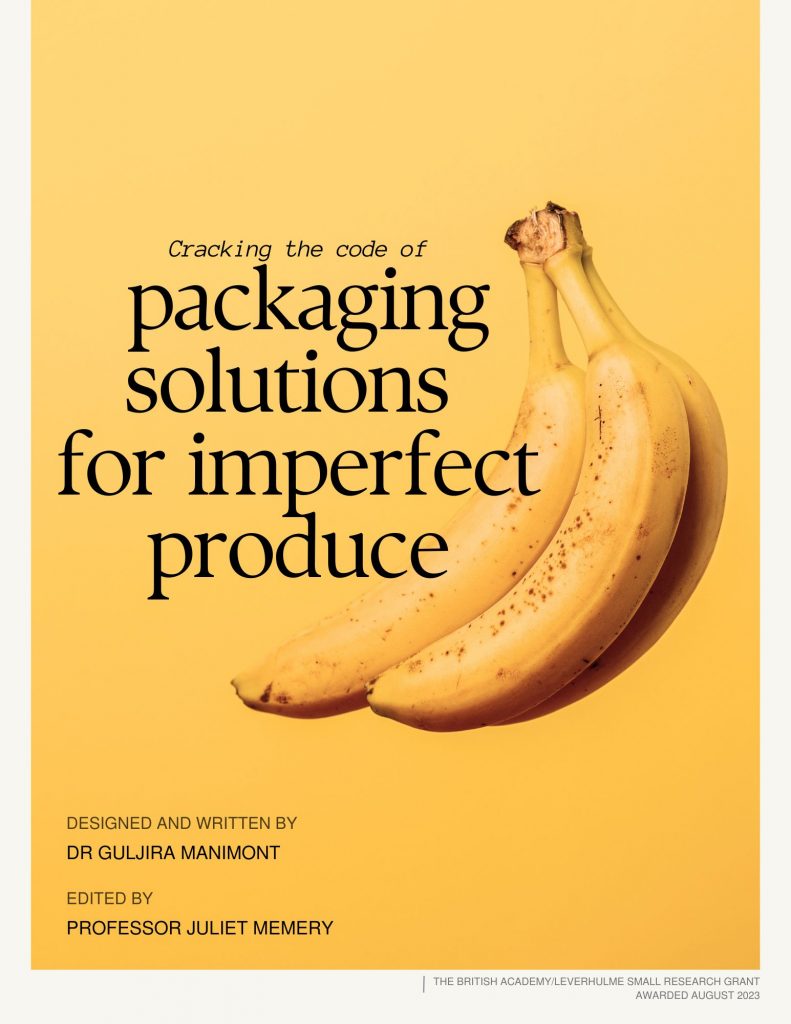
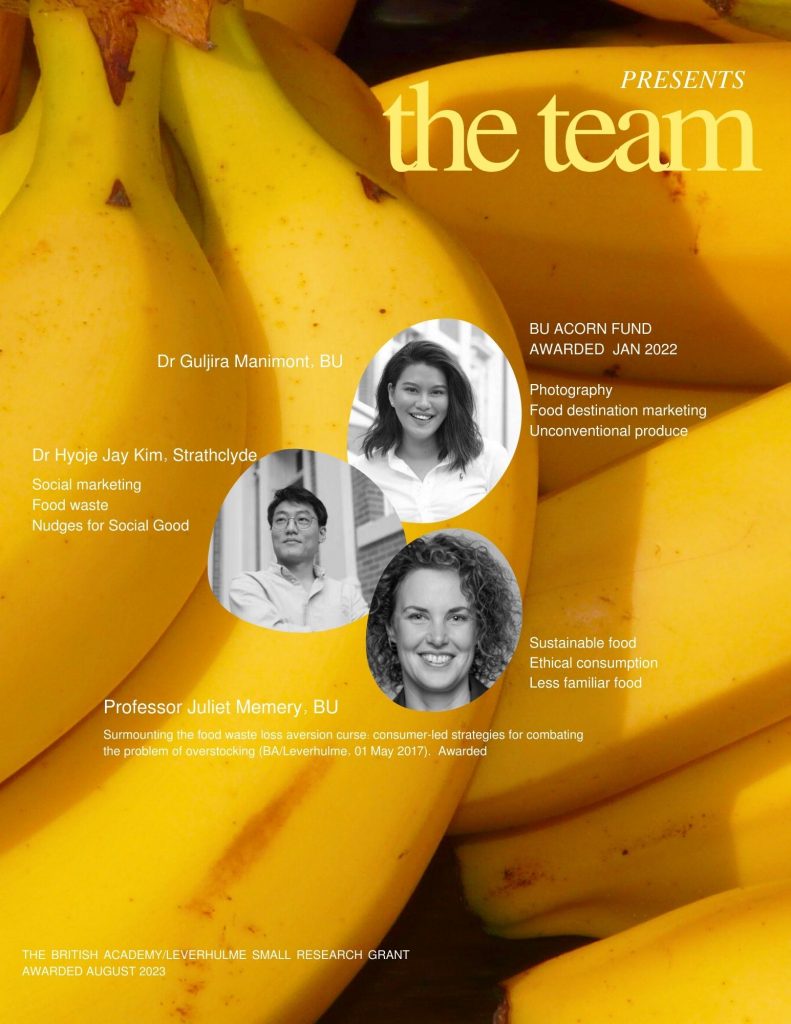
 Principal Investigator – Post Award for RKE session is aimed at any researcher who is, who plans to be, a Principal Investigator for an externally funded research or knowledge exchange project.
Principal Investigator – Post Award for RKE session is aimed at any researcher who is, who plans to be, a Principal Investigator for an externally funded research or knowledge exchange project. The
The 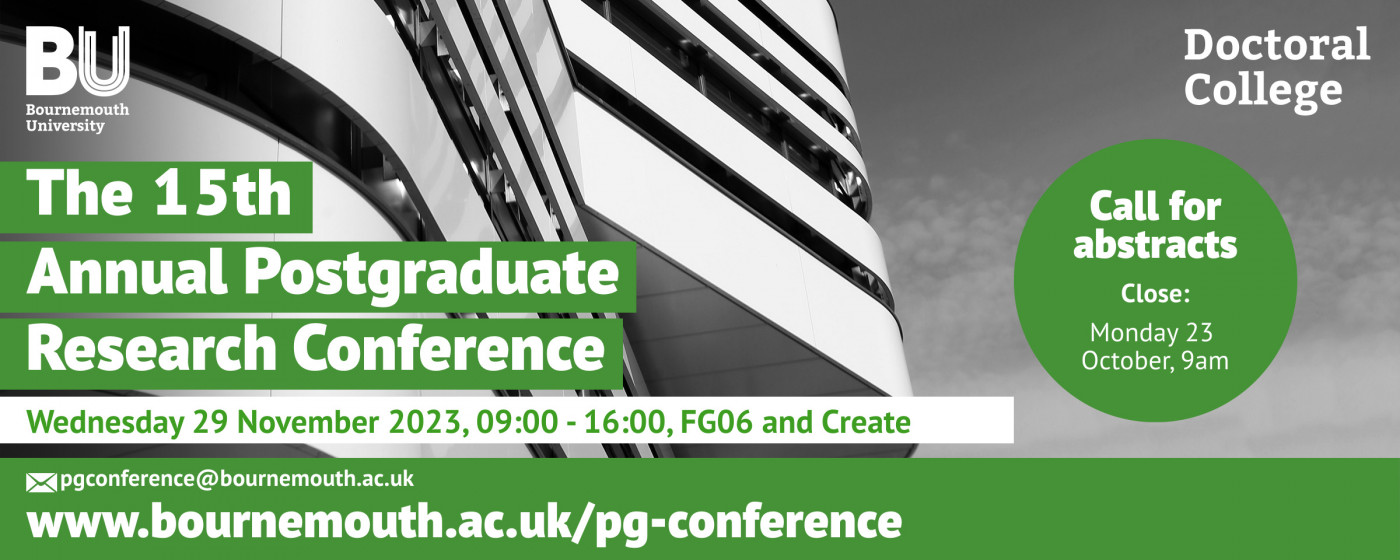
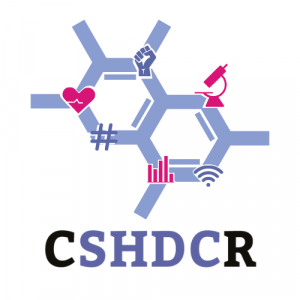
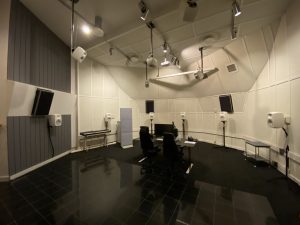












 From Sustainable Research to Sustainable Research Lives: Reflections from the SPROUT Network Event
From Sustainable Research to Sustainable Research Lives: Reflections from the SPROUT Network Event REF Code of Practice consultation is open!
REF Code of Practice consultation is open! BU Leads AI-Driven Work Package in EU Horizon SUSHEAS Project
BU Leads AI-Driven Work Package in EU Horizon SUSHEAS Project Evidence Synthesis Centre open at Kathmandu University
Evidence Synthesis Centre open at Kathmandu University ECR Funding Open Call: Research Culture & Community Grant – Apply now
ECR Funding Open Call: Research Culture & Community Grant – Apply now ECR Funding Open Call: Research Culture & Community Grant – Application Deadline Friday 12 December
ECR Funding Open Call: Research Culture & Community Grant – Application Deadline Friday 12 December MSCA Postdoctoral Fellowships 2025 Call
MSCA Postdoctoral Fellowships 2025 Call ERC Advanced Grant 2025 Webinar
ERC Advanced Grant 2025 Webinar Update on UKRO services
Update on UKRO services European research project exploring use of ‘virtual twins’ to better manage metabolic associated fatty liver disease
European research project exploring use of ‘virtual twins’ to better manage metabolic associated fatty liver disease